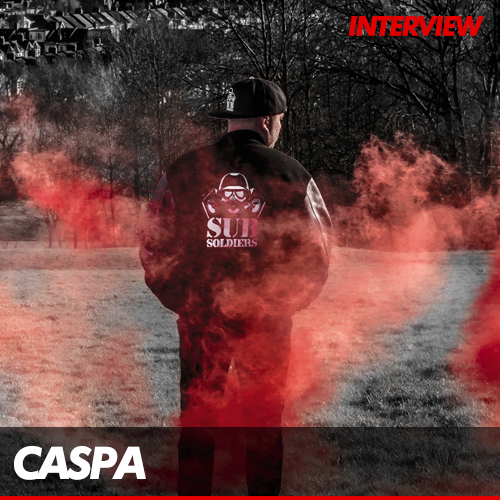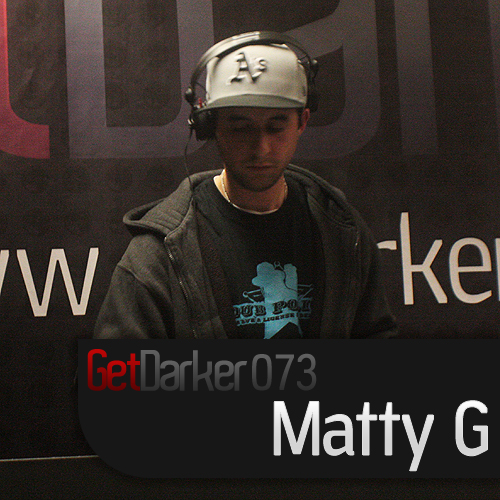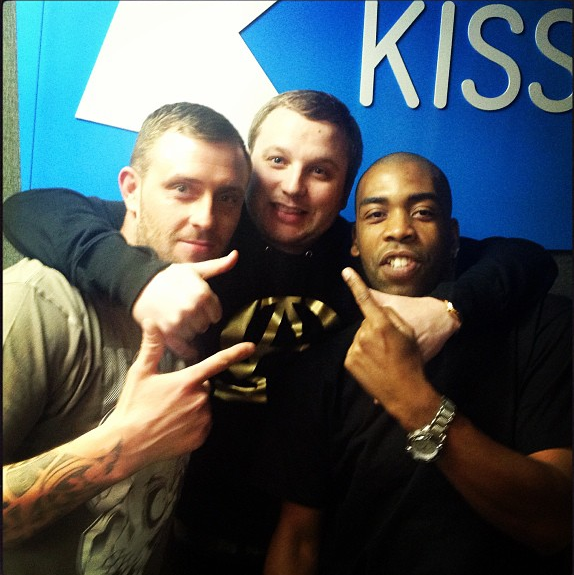
Caspa is something of a legend in the dubstep scene: owner of pivotal label Dub Police and alongside Rusko, for better or for worse, helped break dubstep to the masses with their FabricLive 37 mix. Having travelled both the highs and lows from dubstep’s commercial peak to inevitable decline, unlike many he has stayed the course and stuck firmly to his guns. He’s now back with his third album ‘500’ which looks to take things back to the sweaty, dark basements in which they originated.
Bayfield caught up with him to find out more.

Talk us through the intentions with the new album; you’ve spoken about it being “music to fill basements” instead of stadiums. Do you feel like dubstep has really had its moment (if not a little too long) in pop culture now?
It was never intended for pop culture in the first place, I thought it was maybe a good thing at first, but in hindsight it was probably the worst thing that could’ve happened to the genre. The reason why I say this, is because there was no control over the quality of the music that was labelled Dubstep during that period and the people that were making ‘chart Dubstep’ had no real connection to the scene. For them it was just a ‘payday’ and now they’ve jumped onto the next bandwagon and left all the true artists and labels to pick up the pieces. Don’t get me wrong I like to play festivals and big shows, but Dubstep is at its best in small clubs and basements with big sound systems.
What’s the 500 title all about?
It’s a vision and a feeling of what Dubstep used to be when it first started. 200-500 capacity clubs, we used to press 500 white labels, so I wanted something that was significant to me but that made people wonder what it might mean. On the flip to that I wanted to make an album that sounded like a soundtrack to a movie and in the process I took influences from 28 days later, 300, Sin City and films like that. It was about going back to the heart of what I do and what I know best – maybe something I should’ve been doing this whole time because that’s where I feel most comfortable, but as they say – nothing before it’s time.
Why did you decide to release the album as a series of smaller chapters instead of taking the traditional route?
The way we sell music has changed so much even in the last 12 months, let alone the last 5-10 years. Everything’s new and before it’s had chance to be taken in and processed, it’s yesterdays stale bread and onto the next loaf! Not because it’s not a good piece of work but there’s so many ways to access music now, people are completely spoilt for choice and not just with music to buy, but free music. It’s very rare to find albums that are held on to, listened to and appreciated. Before you know it, within two months of release people are putting up a picture of your album with the caption #TBT (throw back Thursday) and inside i’m thinking ‘Dam, that was the last two years of my life!!’ S o I had to approach the way I release music in the same way that people buy and listen to it, by taking the album and spreading it across six months and drip-feeding it to people with the intention to release the album last, almost as a bonus. This way I feel it gives you more pace and relevance over a period of time to keep connected with fans.
You’re an artist who lives / regularly tours Stateside which seems to be having something of a purple patch at the moment; how does it differ from the UK? Did your travels help to influence the writing of the 500 album?
By the way, I had to google ‘Purple Patch’ I’ve never heard of it before! Dance music in general in the States is huge DJ’s are the next Rockstars, but a lot of what’s going on over there unsustainable in my option. The EDM bubble will burst and it’s gonna be interesting to see how people will react. What I’ve been trying to do is show people that there’s more to club nights than gas canisters, table service and generic, over-saturated dance music. That’s what 500 is about, showing people that there can be good underground nights at a price that people can afford. Look, I’m not advertising to play Weddings and Bar-mitzvahs but what I’m saying is, I feel the new generations of ravers and music lovers have skipped the underground culture of dance music, from their first Sound Cloud listen the next stop is seeing that artist at a huge festival, with no experience of anything in-between. The vibe I’m trying to set with the album and the whole 500 tour is that I want people to understand where this music really came from – that’s basements and small clubs with little or no production but a big sound system.
You’ve got Beenie Man, Klashnekoff and Riko Dan appearing on the album, which is a fairly big selection of vocalists: do you make tracks specifically with artists in mind or is it more a case of you/them choosing pre-existing productions that suit?
Any time I’ve tried to make tracks with people in mind but they’re not there in the studio, it never seems to work as well, I more so use those tracks as a guide for them to lay down a vocal, I then get the stems back and rebuild a brand new riddem around that. Sometimes who I have in mind for the track works and other times a different artist sounds better on it. If I had the choice I’d always prefer to be in the studio with a vocalist. because you can just vibe and throw ideas at each other. And that’s exactly what happened with Klashnekoff on Drum Stick Lick – we met, we smoked, we vibed.
It seems it’s getting increasingly difficult to run a dubstep night and actually turn a profit / pay acts, with many parties seemingly disappearing overnight and an increasing lack of venues (in the UK at least) things are looking a little sketchy. Long term where do you see this ending up?
It’s never been easy, there’s never been any money in it and it’s always been hard! Previously you could put a dubstep night on any night of the week and it would sell out or at least be really busy, when the commercial side of Dubstep faded so did a lot of those promoters and artists/’scenesters’ because that’s what they fed off – that wave of Dubstep and the commercialisation of it. I think a lot of people are scared to do a night now and I get why – 100%, but complaining about it isn’t going to solve the problem, if you truly believe in it that much, you have to put your money where your mouth is and that’s what separates what we do, from everyone else. If you build it they will come, I always thought that saying was a bit over the top, but I actually feel there’s a lot of truth in that, it’s a saying for a reason.
Do you think as a scene more artists should be prepared to take a hit on their set fees in a bid to help stimulate growth? A period of austerity as it were. Sometimes it feels a bit like some people are only seeing things in the short term.
100% Agree, it’s called entitlement syndrome! The hardest thing to accept as an artist is being realistic and I know both sides of this coz I am an artist and I have been a promoter and it’s something that really frustrates me. So many people give the big talk about the scene and the music, but so many of them are fake. There’s big so-called names in our scene that I’ve tried to book for nights, they’ve told me to go to their agent, then the agents try and charge 5 times of what’s even possible within the budget of what you’re trying to achieve. There’s very few people that really get it and understand what your’e trying to do or trying to build, don’t get me wrong there are people that DO understand and are realistic, these are the people that have the most longevity and continue to have a paying career out of Dubstep. On one hand as an artist you want to earn as much money as you think you’re worth or may have been paid before for a similar gig, but you have to understand the realism of other factors which will impact on your fee – how many people does the venue hold, how much are you charging for tickets, who else is on the line-up because these things are important and it’s especially important to look after promoters who keep our scene moving, I suppose it’s just a different way of thinking but something I try to be very conscious of.
I’m sure I remember you saying in conversation once that you started Dubpolice/Subsoldiers with money borrowed from your gran’s pension: did you pay her back?
No, and I never intended to… Just joking!! I honestly never got chance to. Big up nanny Gladys!
What advice would you have for people starting up as producers / DJs / record label owners now?
Be prepared for some hard work coz even in the good times it’s tough, it can be stressful and financially crap! The most important thing as a label is to have a vision of what you want to achieve and a vision of starting a night where you can play the music you love and book the artists that you want and build a following of like-minded people, coz that’s exactly how Dub Police started. And here we are 11 years later, with over 115 releases and tonnes of label tours world wide, still pushing for that same goal.
500 is out now on Dub Police. Purchase HERE




great interview.